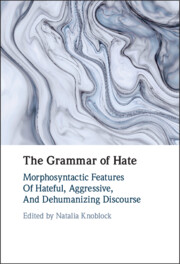Book contents
- The Grammar of Hate
- The Grammar of Hate
- Copyright page
- Contents
- Figures
- Tables
- Contributors
- Acknowledgments
- Introduction
- 1 Animacy and Countability of Slurs
- 2 Language Aggression in English Slang: The Case of the -o Suffix
- 3 Adj+ie/y Nominalizations in Contemporary English
- 4 Grammatical Gender and Offensiveness in Modern Greek Slang Vocabulary
- 5 Unseen Gender
- 6 The Neutering Neuter
- 7 Neutering Unpopular Politicians
- 8 The Power of a Pronoun
- 9 Is Play on Words Fair Play or Dirty Play?
- 10 Expressive German Adjective and Noun Compounds in Aggressive Discourse
- 11 ‘Kill the Invaders’
- 12 ‘I am no racist but …’
- 13 Homophobic Space–Times
- Index
- References
5 - Unseen Gender
Misgendering of Transgender Individuals in Czech
Published online by Cambridge University Press: 30 June 2022
- The Grammar of Hate
- The Grammar of Hate
- Copyright page
- Contents
- Figures
- Tables
- Contributors
- Acknowledgments
- Introduction
- 1 Animacy and Countability of Slurs
- 2 Language Aggression in English Slang: The Case of the -o Suffix
- 3 Adj+ie/y Nominalizations in Contemporary English
- 4 Grammatical Gender and Offensiveness in Modern Greek Slang Vocabulary
- 5 Unseen Gender
- 6 The Neutering Neuter
- 7 Neutering Unpopular Politicians
- 8 The Power of a Pronoun
- 9 Is Play on Words Fair Play or Dirty Play?
- 10 Expressive German Adjective and Noun Compounds in Aggressive Discourse
- 11 ‘Kill the Invaders’
- 12 ‘I am no racist but …’
- 13 Homophobic Space–Times
- Index
- References
Summary
The focus of this chapter is the possible dehumanization or infra-humanization of transgender individuals through grammatical means in the Czech language. This language is rich in these features and uses a grammatical gender for persons (not based on the sex of a subject), as opposed to some, more commonly studied, languages (like English) that mark gender exclusively in pronouns. The research questions concern whether there is any misgendering by morphosyntactic means, and if so, how it is constructed, but also how misgendering is constructed, if not by morphosyntactic means. The material consists of four corpora, one in-group, one out-group, one with news texts and one with online posts of different kinds. To detect cases of misgendering in our corpora the authors look at morphosyntactic alignment within the same clauses as well as in a wider context. The result shows that the neuter pronoun ‘it’, or other neuter misgenderings, are rarely used for trans persons in Czech. Misgendering is constructed mainly by subject–predicate disagreement, but also by predicative nouns such as ‘trans men are women’. When looking for insulting expressions in Czech, the search strategy might thus require complementary parameters compared to e.g. English, enhancing the search for specific morphosyntactic features.
- Type
- Chapter
- Information
- The Grammar of HateMorphosyntactic Features of Hateful, Aggressive, and Dehumanizing Discourse, pp. 97 - 117Publisher: Cambridge University PressPrint publication year: 2022



